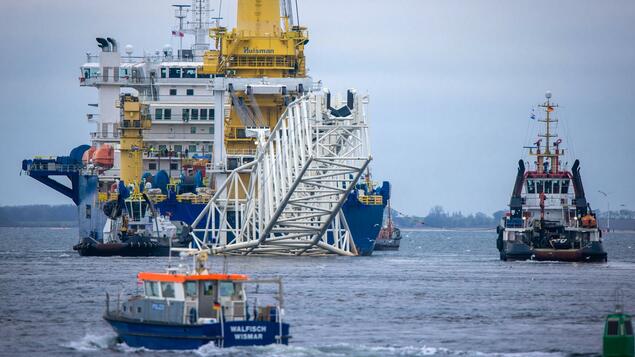The Nord Stream 2 dispute: The United States wants to prevent completion at all costs – the economy

The federal government’s hopes of reaching an agreement with the United States on the controversial Nord Stream 2 gas pipeline are dashed. The US government under Joe Biden has now made clear to the German public that it sees no opportunity to make concessions or restrictive deals that would break American resistance to the project.
The spokesman for the US embassy in Berlin, Joseph Gordono Schultz, Tagesspiegel, said that the new administration in Washington “is determined to use all available means to prevent the completion of Nord Stream 2”.
He responded to a question about potential government offers in Berlin that could ease the conflict. Biden is also under pressure on the issue from the US Congress, as Democrat and Republican politicians are calling for a crackdown on Nord Stream 2.
According to US media reports in Washington, German representatives are looking to whether concessions on trade issues or an offer of German investments in renewable energy in the European Union and Ukraine can satisfy the US side. When asked about potential offers or concessions, the German Foreign Office did not provide any information.
“We will continue to register any organization that may be involved in any sanctioned activity, and we have made it clear that any company risks penalties by participating in Nord Stream 2,” a US embassy spokesman announced.
Is Russia Gaining Much Leverage With Nord Stream 2?
Both President Biden and Secretary of State Anthony Blinken have called for a halt to construction of the pipeline, which they consider dangerous. “It is a geopolitical project by Russia that threatens energy security in Europe as much as it threatens the security of Ukraine and NATO’s eastern partners,” the embassy spokesman said. This ruling “is shared by some of our European partners and even some serious voices in Germany.”
In defense of the project, the German government began accusing the US partner of double standards in dealing with Russia. Foreign Minister Heiko Maas (SPD), for example, targeted the USA in a debate about Nord Stream 2 in the Bundestag in mid-February, even if he did not mention it by name.
He said, “There are countries that ask us to stop construction work, although they themselves are increasing the transportation of heavy oil or imports from Russia at the same time.” The background to the allegations are official US figures, according to which the volume of Russian crude oil shipments to the country is increasing from year to year, and Russia is now the third among oil suppliers to the United States.
According to independent calculations, the share of Russian shipments in US oil demand has been less than 0.5 percent for many years, but has increased in the past decade and reached a record high of seven percent last year.
A paper from the economic advisory department, which lists the major investment projects of Western countries in Russia, also belongs in this context. This aims to nullify the argument that Nord Stream 2 is a single German effort. According to the February list, American companies are involved, among other things, in the construction and operation of the “liquid natural gas” complex in northwest Siberia (“General Electric”).
In addition, an oil and natural gas production project on Sakhalin Island has been mentioned (Exxon Neftegas Ltd., an Exxon subsidiary, is leading the consortium). General Electric operates a joint venture with the Russian state-owned energy company, InterRAO, to produce gas turbines in the country, while Honeywell is building a plant for the transportation and analysis of natural gas in the country. Arsamas is about 500 kilometers east of Moscow outside. The list from the chancellery is also intended to assist representatives of German politics in exchanges with their American partners.
In return, Germany could expand hydrogen projects
Potential offers from the German side to the US government According to Tagesspiegel information, the pipeline dispute also includes huge German investments in expanding hydrogen technology in Ukraine. This is to facilitate the transition into the era of non-fossil energies for Ukraine, which is currently generating income from Russian gas transportation.
Ukraine’s Deputy Prime Minister for European Integration, Olga Stefanichina, recently got hold of the They declared the expansion of renewable energies a central goal for their country.
Green politician Reinhard Boutiqueover is one of the “voices to be taken seriously” in Germany as the US Embassy in Berlin is calling for the suspension of Nord Stream 2. The European Parliament member said the federal government’s proposals to bail out Nord Stream 2 “are not appropriate to open a new path.”
“Such ideas completely ignore the geostrategic dimension of the conflict.” The federal government should finally sit down not only with the United States, but also with the European Union Commission and the Eastern European Union partners in order to find a solution to the problem.
The federal government’s chances of conflict with Washington have become considerably more difficult due to the Russian military advance on Ukraine’s borders. “The United States is increasingly concerned about the increasing aggression of Russia in eastern Ukraine, especially because of troop movements on the country’s borders,” embassy spokesman Gordono Schultz said. The Russian approach is also likely to further narrow Biden’s room for maneuver toward the US Congress.

Twitter fan. Beer specialist. Entrepreneur. General pop culture nerd. Music trailblazer. Problem solver. Bacon evangelist. Foodaholic.



